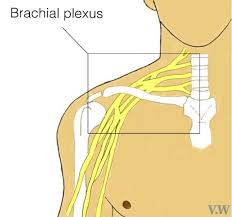Brachial plexus injuries – are they an arm, shoulder or spinal injury?
What is the brachial plexus?
In your neck you have a network of nerves stemming from your spinal cord, which send signals to control the muscles and feeling in your shoulder, arm, hand and fingers. This web of nerves is called your brachial plexus. The sections of the spinal cord that have these nerves are C5, C6, C7, C8 and C11.
An injury can occur to each of the different nerves of the brachial plexus which will affect the symptoms you have. This means that each brachial plexus injury can be quite individual.
Injuries
These nerves may be injured by being stretched, compressed or torn from the spinal cord. Minor brachial plexus injuries can occur when your neck gets pushed in one direction and your shoulder in the other. This can happen when playing contact sports, or climbing, for example.
Severe injuries are more likely to occur from a high impact event such as a motorbike or road traffic accident or fall from a height. Babies can also sustain brachial plexus injuries during a difficult birth for example, when the shoulders get stuck: ‘shoulder dystocia’.
Location of the brachial plexus nerves. Credit: NHS
How do I know if I have a brachial plexus injury?
When the brachial plexus nerves are damaged you can experience a range of symptoms which might include:
- Electric shock or a burning sensation down the arm
- Loss or change of feeling / numbness in the arm or hand
- Weakness in the arm or hand
- Inability to flex the hand and wrist
- Difficulty in moving any or all of: the arm, shoulder, hand and/or fingers
- Complete lack of movement and feeling in your arm and/or hand (paralysis)
- Pain in any or all of: the neck, shoulder and /or arm
As the symptoms affect the shoulder, arm or hand they may easily be confused as being an injury to these specific areas, rather than damage to your nerve or your spinal cord.
If the damage to your brachial plexus is severe, you could experience long term or permanent weakness or sometimes complete paralysis to your arm.
Treatment and Recovery
Your doctor will examine you and may conduct investigations such as undertaking a MRI scan, an X-Ray or nerve conduction studies.
Depending on the severity of your condition, your doctors may treat your brachial plexus injury conservatively (without surgery). In some cases surgery is required.,
Recovery from a brachial plexus injury can take time and on some occasions the damage will be permanent. Your likely recovery time will be discussed with you by your doctors and treating team.
If you do experience long term consequences from a brachial plexus injury, you may need to consider making adjustments in anticipation of a less functional arm and/or hand.
Equipment and Adaptations
Should you find yourself in a position where you have limited or no use of one of your arms on a long term or permanent basis, it will be difficult at first but there are various aids and equipment which might help make life a little easier. For example there are adapted knives, spike boards and one handed clamps to help with cooking in the kitchen. The NHS have produced the following helpful guides of tips and useful contacts entitled ‘support and adaptations after brachial plexus injury’ and ‘one handed activities’.
You may also need to consider adaptations to your car. There are a number of things which can be done, for example having a steering wheel knob fitted, automatic transmission, moving the hand brake or joystick steering, direction indicators and horn within finger reach. You can read more about adapting a vehicle on the government website here.
Ability to continue working
Your injury may also impact on your ability to continue working in the same job. If this happens you could suffer financial difficulties.
If your injury was from an accident that was not your fault, or if your child was injured whilst being born, you may wish to consider if you are able to bring a compensation claim for the extra expenses or loss of income you are now incurring as a result of the injury.
As a brachial plexus injury stems from damage to the nerves that branch out of the spinal cord, this is a type of spinal injury. If you or your child have suffered a brachial plexus injury and wish to bring a claim, you should speak to a specialist solicitor who understands this type of injury.











